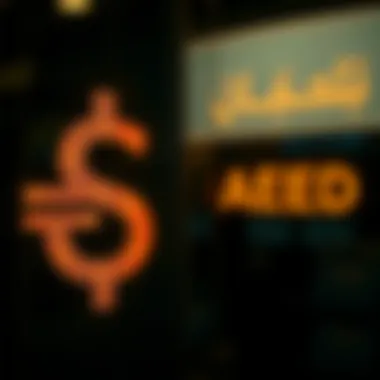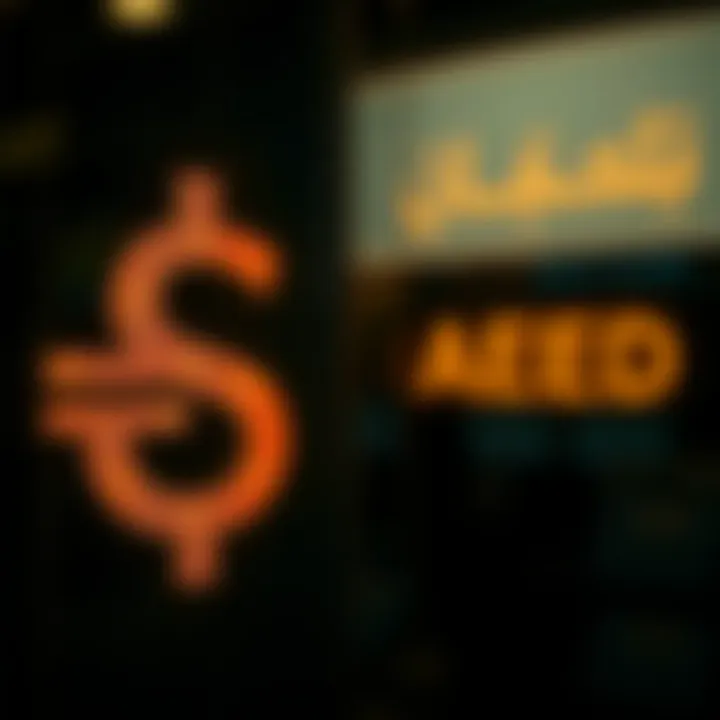Understanding 85 USD to AED: Factors and Insights


Intro
In a world that is becoming increasingly interconnected, understanding currency conversion is essential, particularly for those diving into lucrative markets like Dubai's real estate scene. When considering the conversion of 85 USD to AED, it’s crucial to grasp the nuances of exchange rates, alongside the broader economic factors at play. Several dimensions influence these rates, from economic indicators to geopolitical shifts, and these can make or break your investment strategies, especially if you’re eyeing opportunities in the vibrant Dubai market.
This article aims to elucidate how 85 USD transforms into AED, the implications of fluctuating rates for investors and expatriates, and practical tips for navigatng currency exchanges. By the end of this exploration, you should have a clearer perspective on not only currency dynamics but also how they relate to Dubai's unique economic landscape.
The Significance of Currency Conversion
When you step into the world of international finance and investment, currency conversion becomes a cornerstone of understanding global dynamics. The conversion of 85 USD to AED isn’t merely a transaction; it embodies a wealth of implications that can influence not just personal finances, but also broader economic landscapes. For anyone looking to venture into the real estate market in Dubai, grasping the significance of currency conversion cannot be overstated.
Currency conversion provides insights into economic health and market trends, as exchange rates fluctuate based on various factors such as economic performance, interest rates, and geopolitical events. Knowing how to navigate these changes means the difference between making a savvy investment and, conversely, facing unexpected losses. This arena is peppered with its own technical jargon and nuances, making it essential for an investor to familiarize themselves with these concepts.
The role of exchange rates extends beyond just converting one form of currency to another; it defines purchasing power on a global scale. For instance, if you’re an American investor looking to purchase property in Dubai, understanding how 85 USD translates into AED can help you assess whether it’s a good time to buy or hold off based on market trends. Being informed enables you to capitalize on favorable rates and to avoid pitfalls during less advantageous times.
Moreover, currency conversion impacts daily transactions and long-term investments. The need for efficient currency exchange is paramount, especially for expatriates living or working in the Emirates. Every dirham counts, particularly when dealing with housing, schooling, and medical expenses. Thus, understanding this conversion provides an edge not only in investments but also in managing the intricacies of life abroad.
"The only thing certain in the financial world is unpredictability."
As you make informed decisions in the world of currency conversion, consider the multifaceted implications that come with these exchanges. Ensuring you are on top of exchange rates prepares you not just for immediate transactions but also for strategic long-term planning.
Understanding Exchange Rates
Exchange rates serve as the bridge between currencies, determining how much one currency is worth relative to another. This rate can fluctuate, often influenced by a mix of economic performance, political stability, and market speculation. Knowing how to read these rates is vital for anyone looking to invest abroad.
Furthermore, exchange rates can be categorized as fixed or floating. A fixed rate won't waver much against others, while a floating rate can change frequently based on market conditions. Different countries have different strategies regarding their currencies. Argentina, for example, has faced unique challenges with strict exchange regulations that affect how foreigners engage in its real estate market. Understanding these variants is crucial when you look at similar dynamics, such as those influencing AED value against the USD.
Several factors impact exchange rates:
- Interest Rates: A rise or fall in interest rates can attract foreign investment, affecting demand and supply.
- Inflation: Over time, countries with lower inflation tend to see their currency value increase relative to others.
- Political Stability: Countries perceived as stable tend to have stronger currencies because they present lower risks to investors.
Thus, being cognizant of these factors can help you decode not just immediate market conditions, but long-term trends as well.
Implications for Real Estate Investors
When looking at the real estate market, the implications of currency conversion become even clearer. For an investor in Dubai, the relationship between the USD and AED influences how effectively one can enter the market without burning a hole in their pocket.
- Buying Power: The direct relationship between USD and AED can dictate purchasing power. If the exchange rate is favorable, your 85 USD might give you significantly more AED to work with.
- Market Timing: Investors should continually monitor rates to buy when the rates align favorably. Timing the market often leads to profitable investments.
- Cost Analysis: Beyond the initial purchase, understanding ongoing costs such as maintenance and taxation—often pegged to the local currency—will also be crucial.
In summary, being sharp on the significance of currency conversion not only positions investors to make astute decisions but may very well be the lynchpin of their success or failure in the real estate arena. As economic conditions evolve, so too should an investor's strategy for managing currency exposure.
Current USD to AED Exchange Rate
The exchange rate between the United States dollar and the United Arab Emirates dirham is a critical factor for anyone engaging in currency conversion – especially for those looking into investments or expenditures in the UAE. Understanding this rate provides clarity on the purchasing power one has while converting between these two currencies. A fluctuating rate can have significant implications for your financial decisions.
Factors Influencing Exchange Rates
Numerous elements come into play when determining the USD to AED exchange rate. Key influencers include economic indicators such as inflation rates in both countries, interest rates set by the Federal Reserve in the US and the Central Bank in the UAE, and overall economic stability. For instance, when the Federal Reserve hikes interest rates, it often leads to a stronger dollar as investors seek better returns on investments in USD, reslting in a downward pressure on the AED as demand shifts towards the dollar.
Another strong factor is geopolitical events. Wars, trade disputes, or even political instability in the region can cause fluctuations in exchange rates. When investors perceive risk, they may prefer to hold USD for its relative safety, leading to a higher demand and, in turn, affecting the exchange rate.
Additionally, the supply and demand for both currencies play a fundamental role. If more investors want to convert USD into AED for real estate purchases or travel, it pushes the exchange rate towards a more favorable position for those exchanging money to AED.
- Economic Indicators: Inflation, interest rates, GDP growth.
- Geopolitical Events: Political instability, trade wars, and public sentiments.
- Market Demand: Supply and demand effects from investors and tourists.
Through these facets, one can gather insights into how the USD to AED exchange rate is not just a number, but rather a reflection of broader economic sentiments and regional stability.
Trends in Currency Fluctuations
Monitoring trends in currency fluctuations adds another layer to understanding the USD to AED exchange rate. As a constant ebb and flow, this rate can shift dramatically over short periods due to market sentiment, economic reports, or global financial news. Awareness of these trends can be especially beneficial when timing a currency exchange.


For example, historical data showcases that the AED tends to remain relatively stable against the USD because the UAE government pegs the dirham to the dollar, aiming for a fixed exchange rate. However, when looking at longer trends, seasonal tourism spikes or economic growth in the UAE can lead to temporary fluctuations where the AED strengthens against the USD.
Key Trends to Monitor:
- Seasonal Patterns: Increased tourism often strengthens local currency.
- Economic Reports: Look out for both nations’ economic indicators that may affect rates.
- Public Sentiment: News stories or events that alter investor confidence can create spikes or drops.
As one does the math on their conversion needs, awareness of these factors and trends truly sharpens financial foresight in a world that's ever so dynamic.
For further insight and real-time updates, consider visiting reliable financial news platforms like Investopedia or monitoring currency trends on XE.com.
Calculating USD to AED
Understanding how to calculate 85 USD to AED is crucial for anyone engaging in currency exchange, particularly investors and expatriates navigating the Dubai market. This section highlights the importance of accurately performing such conversions, shedding light on the variables that can influence these rates and the context behind the numbers.
In today’s global economy, currency values shift akin to the wind, influenced by geopolitical events, economic indicators, and market sentiment. For example, a slight shift in oil prices or changes in government policies can dramatically affect the USD to AED exchange rate. Therefore, having a finger on the pulse of these shifts is essential for making informed decisions, especially when transacting in foreign currencies.
Being able to convert 85 USD to AED accurately can help avoid costly mistakes and streamline budget planning in real estate or other ventures. Understanding the mechanics behind the conversion can serve not just as a tool but a vital step towards strategic investment decisions.
Simple Conversion Calculation
Calculating the conversion of 85 USD into AED can appear straightforward, yet it involves understanding the current exchange rate. Let’s break it down into manageable steps:
- Find the Current Exchange Rate: This can be done through a reliable online source, financial news platform, or bank. At times, this rate may differ slightly between these sources.
- Multiply by 85: Use the formula 85 USD * (current exchange rate) = amount in AED. For instance, if the exchange rate stands at 3.67 AED for 1 USD, the calculation would be:
- Account for Fees: Depending on where you conduct the exchange, there may be additional fees or commissions. As a result, it may be beneficial to add a percentage for these potential costs.
This simple formula is powerful in making everyday decisions – from planning your trip to budget for a real estate investment. It helps in translating what might seem like a foreign currency constraint into a more relatable local currency, hence bridging multiple worlds in a bustling economic hub like Dubai.
Examples of Transaction Scenarios
Let’s consider a couple of practical scenarios illustrating how calculating 85 USD to AED plays out in real-life situations:
- Scenario 1: Buying Property
An expatriate looking to buy a property in Dubai needs to convert savings to AED. Knowing that converting 85 USD equates to about 311.95 AED after accounting for conversion fees becomes crucial. This understanding allows for precise budgeting towards a down payment. - Scenario 2: Sending Money Back Home
An expatriate who decides to send money back home must also consider conversion. If they want to send 85 USD back to their family, they first recalculate based on the latest exchange rate to ensure their family receives the correct amount in their local currency.
These situations highlight the importance of understanding currency conversion in practical terms, helping to visualize how it impacts day-to-day financial decisions.
Accurate calculations can save expatriates and investors from pitfalls when navigating the market, making understanding currency conversion an essential skill.
Currency Exchange: Practical Aspects
Currency exchange is not just a mere transaction; it's a complex process that plays a vital role in the global economy. When dealing with the conversion of 85 USD to AED, understanding these practical aspects becomes paramount. Whether you're an investor eyeing opportunities in Dubai or an expatriate managing living costs, the nuances of currency exchange can directly influence your financial outcomes.
In this section, we will look at key elements you should keep in mind while navigating the currency exchange landscape. We will tackle the selection of an exchange service and investigate the often-overlooked fees and hidden costs associated with currency conversion.
Selecting a Reliable Exchange Service
Choosing the right exchange service is akin to picking a trustworthy mechanic for your car—it’s crucial for avoiding pitfalls that could cause financial strain. There are various options out there: banks, money changers, and online platforms. Here’s what you need to consider:
- Reputation: Opt for services that have positive reviews and a solid track record. Look for ratings on platforms like Reddit or finance forums.
- Convenience: Some services may offer online transactions, which save time and hassle. Check their hours of operation and whether appointments are needed.
- Transaction Limits: Be mindful of any limits they may impose, especially if your currency conversion needs are substantial.
"The right exchange service can save you not just money but also peace of mind. "
Review the available customer service options as well. A responsive customer support team can be invaluable when dealing with questions or complications. In a world that's moving faster than a kid's bike on a downhill slope, having that reassurance can make all the difference.
Fees and Hidden Costs in Currency Exchange
While the headline rate for currency exchange may catch your eye, it’s the fees and hidden costs that often bite. Understanding these expenses can turn a seemingly good deal into a less favorable one. Here are several aspects to consider:
- Transaction Fees: Some services charge a flat fee per transaction or a percentage of the total exchanged amount. Don’t gloss over this; compute it into your overall cost.
- Exchange Rate Mark-Ups: Many providers do not offer the interbank rate, which banks use amongst themselves. Instead, they may add a markup. Always compare rates from different sources before deciding.
- Service Charges: Be aware of any additional costs that might arise, such as foreign transaction fees when transferring money internationally.
In the grand scheme of things, these costs can accumulate like autumn leaves after a storm. Thus, doing thorough research could save you from over-spending when converting your 85 USD to AED.


Navigating the currency exchange landscape can feel like walking a tightrope, but with careful selection and keen awareness of fees, you can maneuver these waters more smoothly. As you prepare to make financial moves in a foreign currency market, remember that knowledge truly is your best ally.
Impact on Real Estate Decisions
Navigating the intricate world of real estate investing in Dubai requires not just an eye for prime properties, but also a solid grasp of currency dynamics. The impact of currency conversion is profound, particularly when dealing with significant transactions. Investors contemplating purchases in AED must pay attention to exchange rates, as fluctuations can dramatically affect the overall cost of their investments. For instance, even a small change in the USD to AED exchange rate can change the price of a property, potentially costing thousands more than originally anticipated.
Budgeting for Investments in AED
When budgeting for investments in AED, precision is key. Investors need to forecast their expenses accurately by considering the current exchange rate between USD and AED. Here’s how one can effectively allocate funds:
- Calculate the Approximate Cost: Start by determining the current exchange rate for 85 USD. Assuming it translates to about 311 AED, understanding this conversion helps set realistic expectations.
- Consider Fluctuations: Regularly monitor currency trends as they influence your total budget. A minor dip in your currency can impact what you end up paying.
- Set a Buffer: Prices often fluctuate in the real estate market due to various factors, from market demand to regulatory changes. Including a buffer in your budget can safeguard against unexpected shifts in the exchange rate, ensuring you don’t run short.
- Account for Additional Fees: Also, don’t forget to consider any transaction fees or conversion costs associated with converting USD to AED, as these can nibble away at your available funds.
It's essential to use precise calculations for budgeting. A miscalculation can lead to overspending or missed opportunities. Consider using currency conversion tools or calculators to streamline this process.
Market Opportunities for USD Investors
Dubai's vibrant real estate market offers numerous opportunities for USD investors. Understanding how currency conversion impacts the buying landscape is crucial for maximizing investments.
- Attractive Pricing for Foreign Investors: With a strong dollar, property in Dubai may appear more appealing to USD investors, particularly if the AED is weaker. This can lead to significant real estate purchases at a relative bargain.
- Diverse Portfolio: Investing in AED allows investors to diversify their portfolio and hedge against currency risk. Owning property in Dubai, a growing market, can offer substantial returns on investment over time.
- Emerging Local Developments: Pay attention to emerging areas within Dubai. Areas like Dubai Creek Harbor are becoming more attractive due to new developments aimed at expatriates and investors. These properties can be purchased at lower prices compared to established areas, providing better investment potential.
Utilizing a well-informed currency strategy alongside careful observation of local market trends can unlock valuable opportunities for USD investors. The nuances of currency conversion can be leveraged to gain a strategic edge, potentially resulting in a fruitful venture in the Dubai real estate market.
Remember, every 1% shift in the exchange rate can mean significant changes in your investment outcomes.
Expatriate Considerations in Currency Exchange
When it comes to currency exchange, expatriates find themselves navigating a landscape filled with challenges and opportunities. Understanding the currency dynamics is especially crucial for those living in regions like Dubai, where the economy thrives on an ever-evolving influx of international investors. The focus here is on how expatriates can manage their currency conversion effectively to fulfill their financial objectives and sustain their lifestyle.
Living Costs and Currency Conversion
Living costs in Dubai can vary significantly based on the area one chooses to reside in and the lifestyle they adopt. Currency conversion plays a pivotal role in budgeting and financial planning for expatriates. It's not just about converting 85 USD to AED; it's about understanding how fluctuations in the exchange rate can impact day-to-day expenses.
For instance, housing is a big chunk of an expatriate’s budget, with rents generally quoted in AED. When an expatriate earns in USD, it's crucial to keep a keen eye on the exchange rates, as a rise or drop might mean paying much more or less than anticipated for rent.
- Rental prices vary widely, often influenced by the season and local demand.
- Daily essentials, such as groceries and transportation, can also be affected by currency fluctuation. Importantly, currency conversion can significantly affect an expatriate’s disposable income, impacting the choices they make when shopping or dining out.
In essence, expatriates need to continually monitor the exchange trends and recalibrate their budgets accordingly.
Wealth Management Strategies for Expatriates
Expatriates have unique financial needs, and as such, they require tailored wealth management strategies, which include more than just basic currency conversion practices. With their assets often held across different countries, expatriates must think critically about how to manage these resources efficiently.
An effective strategy could involve:
- Diversifying Currency Holdings: Rather than keeping all assets in one currency, spreading wealth across various currencies can mitigate risks associated with exchange rate volatility.
- Investment in Local Assets: Investing in local real estate or business can provide a buffer against currency fluctuation risks. It also anchors expatriates in the local economy and opens up avenues for additional income.
- Regular Consultation with Financial Advisors: Engaging with a financial expert familiar with expatriate challenges can help navigate currency risks. This is particularly vital for expatriates in rapidly changing economic climates, ensuring they make informed decisions.
Moreover, having a long-term view of investments while being mindful of short-term exchange rate movements can prevent expatriates from making hasty decisions based on market noise.
Navigating currency exchange while living in a foreign land can seem daunting. Yet, with the right strategies—rooted in a deep understanding of both living costs and effective wealth management—expatriates can manage their finances with confidence and clarity.
"Knowledge of currency conversion is not just about figures; it's about empowering expatriates to create a stable financial future."
Currency Exchange Tools and Resources
Currency exchange tools and resources are vital for anyone looking to navigate foreign exchange transactions with ease and accuracy. As the dynamics of currency conversions can often be quite complex, having the right tools at your fingertips can make all the difference. Both investors and expatriates seeking to convert 85 USD to AED, for instance, would benefit from utilizing these resources, allowing them to make informed financial decisions.
Online Currency Conversion Calculators
Online currency conversion calculators are simple yet powerful. They allow users to input a specific amount, such as 85 USD, and convert it instantly to AED based on current exchange rates. These calculators are often updated in real time, reflecting market fluctuations. This means the figures you receive can change throughout the day, depending on economic factors ranging from geopolitical events to inflation rates.
When considering which calculator to use, a few key points should be kept in mind:


- Look for calculators that provide historical data. This feature is particularly useful for investors who want to track trends over time.
- Ensure that the calculator is from a reliable source. Websites like XE.com or OANDA are well-regarded in the finance community.
- Some advanced calculators offer additional features like converting multiple currencies in one go or providing an equivalent in various denominations, proving exceptionally handy for budget planning.
Mobile Apps for Currency Monitoring
In today's fast-paced world, monitoring currency changes on the go is crucial. This is where mobile apps come into play. With just a few taps on your smartphone, you can track live exchange rates, set alerts for favorable rates, and perform quick calculations to ensure you're always in the loop.
Choosing the right mobile app involves several considerations:
- User-friendliness is essential. An intuitive interface allows you to navigate easily, ensuring you can quickly find the information you need.
- Security features are paramount. Opt for apps that offer robust encryption to protect your financial data.
- Check for offline capabilities. Some apps can store recent exchange rates, allowing you to work without an internet connection.
Popular apps such as Currency Converter Plus and Easy Currency Converter not only provide conversion rates but also aggregate user reviews, which can aid in determining their reliability and performance.
"In the world of currency exchanges, staying informed is half the battle won. With the right tools, you can navigate these waters confidently."
Overall, leveraging these tools and resources can empower investors, agents, analysts, expatriates, and buyers to effectively manage their currency exchange needs. The insights provided can better equip individuals to make well-informed decisions in the often unpredictable financial landscape.
Future Trends in Currency Exchange
In today's fast-paced financial environment, understanding the future trends in currency exchange can be a game changer for investors and expatriates alike. The dynamics of currency markets are constantly evolving, driven by technological advances, regulatory changes, and shifting global economic landscapes. Appreciating these trends not only prepares you for changes but also helps you make more informed decisions regarding your investments and currency exchanges. Let's dive a bit deeper into the critical components that are shaping the future of currency exchange.
Technological Innovations Impacting Currency Exchange
In recent years, technology has made remarkable strides in reshaping how currency exchange operates. One cannot ignore the role of digital platforms that enable real-time trading, allowing users to swap currencies with just a few clicks. Services like Wise and Revolut have changed the game by offering seamless, low-cost exchanges without the high fees typically associated with traditional banks.
Moreover, advancements such as blockchain technology are on the rise.
- Transparency and security: Blockchain provides a level of security and transparency that is unmatched. Transactions being recorded on a public ledger means that fraud is less likely and trust can be established easily.
- Speed: Transactions using blockchain can occur almost instantaneously, which is a far cry from the days when transfers could take hours or even days.
- Lower fees: As more people adopt cryptocurrencies, the shift may lead to decreasing traditional currency exchanges' fees, making it easier for individuals to trade and invest.
As more players enter this space, the competitive landscape will strengthen. Hence, understanding these trends is crucial for anyone engaged in currency exchanges.
The Role of Cryptocurrency in Currency Dynamics
Cryptocurrency has emerged as both a disruptor and a complement to traditional currency systems. With Bitcoin, Ethereum, and many altcoins making waves, they are not just new investment vehicles but also alternative currencies in their own right.
Here’s how cryptocurrency is influencing currency dynamics:
- Global Accessibility: Cryptocurrencies are accessible to anyone with an internet connection, breaking down barriers that previously restricted traditional banking.
- Valuation Fluctuations: The volatility of cryptocurrencies poses both risks and opportunities. A savvy investor can leverage this fluctuation to their advantage.
- Decentralization: Unlike traditional currencies controlled by central banks, cryptocurrencies operate on decentralized networks, allowing for greater autonomy in financial transactions.
- Cross-border Transactions: Using cryptocurrency can simplify lending or investments across countries, where different currencies can make transactions cumbersome and expensive.
Though still in its infancy, the integration of cryptocurrencies into the financial fabric is likely to deepen and become more complex over time. Investors should keep an eye on these trends, as they may significantly influence the way currency conversion is seen and executed in the coming years.
The landscape of currency exchange is changing—understanding these shifts can lead to well-informed investment strategies and minimize conversion risks in evolving economic conditions.
Investors and expatriates can capitalize on these observations, adapting their approaches to currency exchange as the future unfolds. Keeping an eye on both technological innovations and the proliferation of cryptocurrencies will undoubtedly provide strategic advantages.
Summarizing Key Takeaways
In today’s global market, understanding currency conversion is more than just a trivial detail; it’s a compass guiding investors and expatriates through the complex landscape of financial decision-making. Our discussion around the conversion of 85 USD to AED has underscored several pivotal aspects that are essential for anyone looking to engage in currency exchange, especially when considering investments in the dynamic Dubai real estate market.
One major takeaway involves the significance of staying updated on current exchange rates. Fluctuations can be as unpredictable as the weather, influenced by various factors such as economic performance and geopolitical developments. Therefore, being proactive in monitoring these rates can lead to substantial savings, whether you are converting small sums for everyday use or large amounts for property investment.
Another crucial element is the recognition of hidden costs. Currency exchange isn’t merely about trading dollars for dirhams. Factors such as service fees, transaction charges, and market spreads can significantly affect the net amount received. Understanding these costs allows for better budgeting and financial planning.
Investors must also consider the implications of currency volatility on their purchasing power. The purchasing power may vary significantly based on exchange rates, affecting everything from the price of property to rental yields. For expatriates, this means ensuring that financial strategies account for these fluctuations, potentially safeguarding their investments.
Moreover, our analysis highlighted the importance of utilizing effective tools for currency exchange. From online calculators to specialized mobile applications, these resources can be a boon for anyone engaging in currency transactions. This aligns well with the fast-paced nature of modern financial practices where time and accuracy are of the essence.
Investing in currency exchange without proper knowledge is like sailing without a map—eventually, you’ll find yourself lost.
Finally, we stressed the role of technological advancements, such as cryptocurrency and innovative exchange platforms, in shaping currency dynamics. These developments not only enhance accessibility but also introduce new considerations for both traditional and modern investors.
In summary, understanding the conversion of 85 USD to AED is essential for making informed financial choices. By grasping key considerations, monitoring trends, and utilizing modern tools, investors and expatriates can navigate the intricacies of currency exchange effectively, positioning themselves for success in today's fluid economic environment.
Essential Considerations for Investors
For investors, each decision made in the realm of currency exchange carries significant implications. Currency fluctuations can lead to drastic changes in return on investment. Understanding the local market conditions while assessing exchange rate trends is vital. Whether engaging in short-term currency operations or considering long-term investments in real estate, aligning one’s strategies with currency movements can yield better outcomes.
Investors should also develop strong relationships with various currency exchange providers, allowing them to shop around for the best rates available. Establishing connections also could provide early insights into upcoming changes in the market, which could be quite valuable for investment timing.











